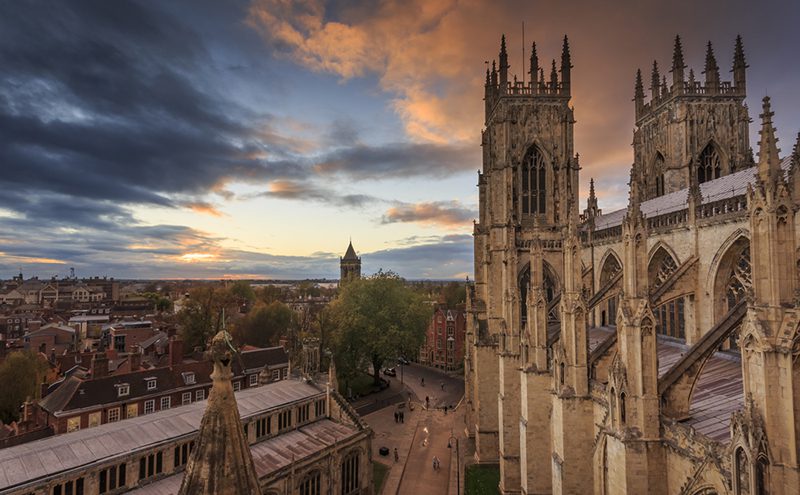
City of York Council is set to invest £1.6million in a new Clean Air Zone (CAZ) in York, which is aimed at improving exhaust emissions from local bus services.
The council is working alongside local bus operators to help tackle traffic pollution in York’s city centre – mainly caused by diesel vehicles, which can be harmful to people’s health.
The proposals went out to consultation last year and the responses have provided valuable feedback to help shape the future Clean Air Zone.
Unlike other parts of the country where a Clean Air Zone is a mandatory requirement, the council is proactively looking to introduce the new zone by 2020, in recognition of the impact that poor air quality can have.
A report will be taken to Executive on Thursday 17 January outlining the feedback of the consultation, which over 250 residents and businesses responded to, including bus operators.
Cllr Andrew Waller, Executive Member for the Environment at City of York Council, said: “I’d like to thank everyone for their feedback. An overwhelming 90 per cent of those who responded agreed that we should introduce a new Clean Air Zone by 2020.
“We are also really grateful for the feedback and support from bus operators which has helped to shape our thinking. City of York Council has already assisted operators to obtain grants to improve the emissions from the City Sightseeing and Park & Ride buses. We now need to take further steps to reduce emissions from the rest of the local bus fleet. Investing £1.6m will go a great way to tackling this issue, as well as introducing more electric Park & Ride buses across the network in 2019.
“We understand the vital role that the city’s local bus services play in bringing people into York to work, shop and make use of key services. Targeting the buses which most frequently pass through the city centre will have the greatest impact on reducing harmful pollutants by insisting on the use of electric or Euro VI diesel technology.”
Cllr Peter Dew, Executive Member for Transport, said: “The council has looked at many ways to improve air quality in the city centre, so we are delighted to be able to earmark £1.6m into working with bus operators to apply the proposed Clean Air Zone to local bus services.
“This consultation was a really crucial part of how we can continue to work with operators to help reduce pollution by 2020-21”.
If the proposals are approved, the CAZ will be introduced from January 2020. A twelve month ‘sunset period’ will be put in place, however, to ensure vehicles not meeting the requirements may continue to be operated, if evidence can be submitted demonstrating that orders have been placed for these vehicles to be replaced or upgraded. Measures will also be put in place from January to tackle bus idling.
If approved at Executive, the recommendations will be taken to Budget Council in February.
Executive takes place on Thursday 17 January from 5.30pm and is open to members of the public or is available to watch live online from: www.york.gov.uk/webcasts
To find out more about the report, or to attend, visit: https://democracy.york.gov.uk/ieListDocuments.aspx?CId=733&MId=10476
Why we need to reduce air pollution
We don’t always see it but air pollution harms our health. Evidence shows that spending time in areas with high levels of air pollution can worsen asthma symptoms, damage lung function and cause other health problems such as heart attacks, strokes and low birth weight. This ill health means time off work and school and a cost to the NHS and our economy. Poor air quality is also linked to about 40,000 early deaths in the UK every year.
City of York Council has a legal duty to improve air quality to protect health by 2021.
What are we already doing?
City of York Council already has several long term policies in place to manage traffic levels and reduce pollution. These aim to:
• Reduce the total number of vehicle trips – by encouraging walking, cycling and public transport use
• Reduce taxi emissions – by mandating emissions standards for taxis operators
• Increase electric vehicle take up by providing electric vehicle charging points, converting some buses from diesel to electric and transferring goods from HGVs to bicycles or lower emission vehicles
• Limit further pollution – by encouraging low emission developments
• Prevent unnecessary pollution by tackling vehicle idling
• Lead by example – by reducing pollution from council vehicles
Clean Air Zone Proposal
The council is proposing to introduce a Clean Air Zone (CAZ). This will require any individual bus operating on a public local bus service, into the Clean Air Zone, five or more times per day to be ultra low emission bus standard.
Ultra low emission buses (ULEBs) are those that have no exhaust emissions (e.g. electric buses) or have significantly reduced pollution emissions such as Euro 6 diesel buses, gas powered and electric hybrid buses.
If you want to find out more about air quality in York visit www.jorair.co.uk.








